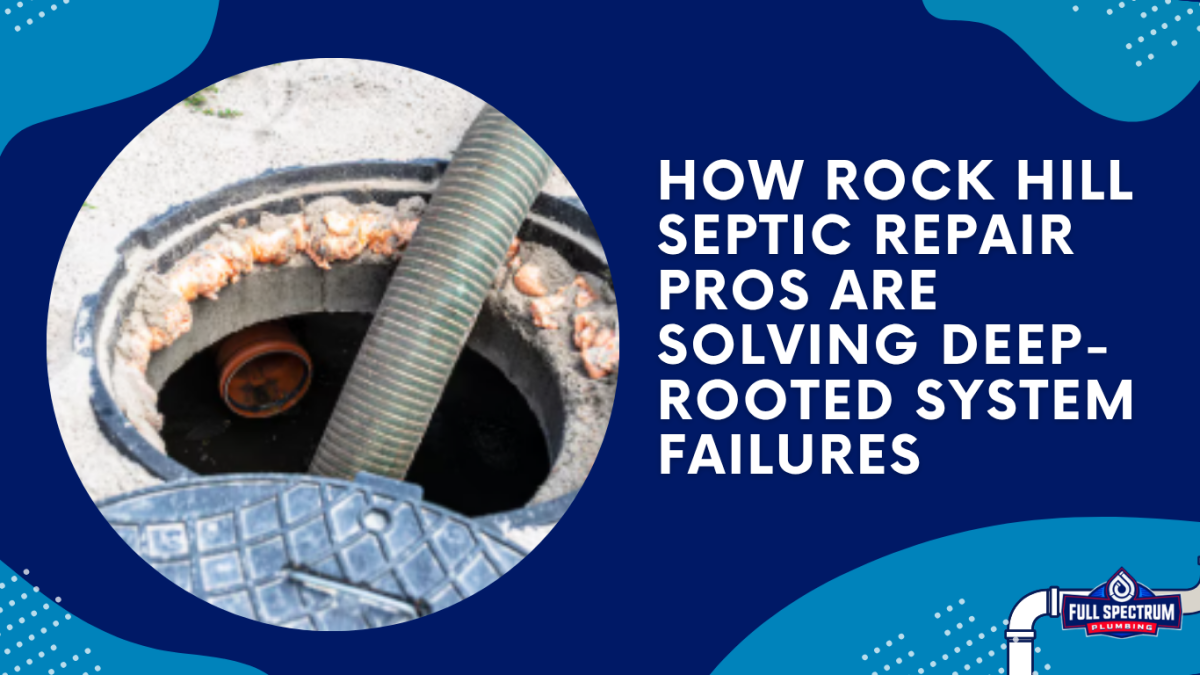Septic system issues are never something homeowners want to face, especially when they are deep-rooted and complex. Unlike simple clogs or routine maintenance tasks, serious septic system failures often demand expert-level solutions.
Fortunately, Rock Hill septic repair professionals are stepping up to meet these challenges with innovative diagnostic methods, cutting-edge repair techniques, and preventative strategies that ensure long-term system health.
Here’s a closer look at how the pros are tackling even the toughest septic system problems—and how homeowners can stay one step ahead.
What are the Most Common Causes of Deep-Rooted Septic System Failures?
Deep-rooted septic system failures rarely happen overnight. They usually build up over years due to a combination of factors. Understanding these causes is the first step toward both repair and prevention:
-
Aging Infrastructure: Septic systems, like any other part of a home, have a lifespan. Tanks, pipes, and drain fields deteriorate with age, often leading to cracks, leaks, and total system failure.
-
Tree Root Intrusion: Roots from nearby trees and shrubs can aggressively invade pipes and tanks, causing blockages, cracks, and even collapses.
-
Improper Installation: Septic systems not designed or installed correctly are vulnerable to premature failure. Poor soil testing, incorrect tank sizing, and shoddy workmanship all contribute to long-term issues.
-
Neglect and Lack of Maintenance: Skipping regular pumping, inspections, and maintenance allows solids to build up in the tank and infiltrate the drain field, causing serious backups and drain field saturation.
-
Excessive Water Use: Overloading a septic system with too much water at once can overwhelm its capacity, forcing untreated wastewater into the drain field or backing it up into the home.
-
Chemical Damage: Harsh household chemicals, antibacterial products, and solvents can disrupt the natural bacterial balance in the septic tank, impairing its ability to break down waste effectively.
-
Soil Failure: If the soil in the drain field becomes compacted, saturated, or clogged with solids, it will no longer absorb and treat wastewater properly, leading to system-wide breakdowns.
Each of these issues requires a tailored approach to fix, especially when multiple factors are present at once.
How Do Rock Hill Septic Repair Experts Diagnose Complex Septic Issues?
When a septic problem runs deeper than a simple clog or minor backup, Rock Hill professionals use a combination of techniques to uncover the true cause of the failure. Their diagnostic approach typically includes:
-
Advanced Camera Inspections: Tiny, waterproof cameras are inserted into the system's piping to visually inspect for cracks, intrusions, blockages, and other hidden damage. This non-invasive method offers precise information without costly excavation.
-
Soil and Drain Field Testing: Professionals test the soil’s absorption capacity and look for signs of drain field saturation or failure. This helps determine if wastewater is being properly treated once it leaves the tank.
-
Tank and Component Inspections: Thorough physical inspections of the tank, inlet and outlet baffles, distribution box, and other components are critical. Technicians look for signs of corrosion, sludge overflow, and structural compromise.
-
Water Flow and Dye Testing: Dye is sometimes introduced into the plumbing system to trace the flow of wastewater and locate blockages, leaks, or overflows in the drain field.
-
Historical Analysis: Professionals often review the property's maintenance records, past repairs, and system design to understand the bigger picture behind recurring failures.
By combining these diagnostic tools, experts can pinpoint issues with remarkable accuracy, ensuring that repairs address the root cause—not just the symptoms.
What Advanced Solutions Do Professionals Use to Fix Severe Septic System Problems?
When standard fixes aren’t enough, Rock Hill septic pros turn to a range of advanced solutions that are designed for long-term success. Some of the methods they rely on include:
-
Pipe and Tank Replacement: In cases of severe corrosion, cracking, or root intrusion, replacing sections of pipe or even the entire septic tank may be necessary. Modern materials like PVC offer greater durability and resistance to future damage.
-
Trenchless Pipe Repair: Instead of digging up an entire yard, trenchless methods like pipe lining or pipe bursting allow technicians to repair or replace pipes with minimal surface disruption.
-
Root Removal and Prevention: If roots have invaded the system, they are often cut out using mechanical rooters. To prevent future problems, chemical root inhibitors may be applied, or strategic landscaping adjustments are recommended.
-
Drain Field Rehabilitation: Failing drain fields may be rejuvenated through techniques like soil fracturing (injecting air into the soil to loosen it), adding new gravel, or installing additional drain lines to restore proper wastewater absorption.
-
Bacterial Additive Treatments: Introducing specialized bacterial additives can help restore the natural balance within the septic tank, improving breakdown efficiency and reducing solids accumulation.
-
Aerobic Treatment Unit (ATU) Installation: For systems that can’t be repaired traditionally, upgrading to an aerobic treatment system—which uses oxygen to speed up waste breakdown—can be a game-changer. These systems are particularly useful for properties with poor soil conditions.
-
Smart Monitoring Systems: Some modern repairs include installing monitoring sensors that track tank levels, water usage, and system performance in real-time, allowing homeowners and professionals to address issues before they escalate.
These solutions aren’t one-size-fits-all. Skilled Rock Hill septic technicians customize their approach based on system age, soil conditions, household size, and other critical factors.
How Can Homeowners Prevent Future Septic Failures After Professional Repairs?
After investing in professional septic system repairs, homeowners naturally want to avoid facing similar problems again. Taking proactive steps can dramatically extend the life of a repaired or replaced system:
-
Schedule Regular Inspections and Pumping: Tanks should typically be pumped every 3 to 5 years, depending on household size and usage. Regular inspections catch small issues before they turn into big ones.
-
Conserve Water Usage
-
Install water-efficient appliances.
-
Spread out laundry loads throughout the week.
-
Fix leaky faucets and running toilets immediately.
-
Less water flowing into the system means less stress on tanks and drain fields.
-
Be Mindful of What Goes Down the Drain
-
Only human waste and toilet paper should be flushed.
-
Avoid dumping grease, oil, coffee grounds, and harsh chemicals down sinks or toilets.
-
Protecting the bacterial balance inside the septic tank is key to proper function.
-
Protect the Drain Field
-
Never park vehicles or place heavy structures on the drain field.
-
Divert rainwater runoff away from the drain field area to prevent saturation.
-
Allowing the soil to stay loose and absorbent is vital for treatment performance.
-
Landscape Carefully
-
Avoid planting trees or large shrubs near the septic system.
-
Choose grass or shallow-rooted plants over drain fields to minimize intrusion risks.
-
Install Filters and Alarms
-
Effluent filters at the tank’s outlet can prevent solids from reaching the drain field.
-
Septic alarms can alert homeowners to potential overflows or high water levels early.
By incorporating these habits into daily life, homeowners can ensure that their septic systems stay healthy and functional for decades after professional repair work is completed.
Trust Full Spectrum Plumbing Services to Restore and Protect Your Septic System
When deep-rooted septic issues threaten your home’s safety and comfort, count on the experts at Full Spectrum Plumbing Services to provide lasting solutions. Our team specializes in diagnosing and repairing even the most complex septic system failures with precision and care. From invasive tree roots to saturated drain fields and aging infrastructure, no challenge is too big or too small for our seasoned professionals.
Choosing us means choosing reliable service backed by advanced technology, honest assessments, and a commitment to doing the job right the first time. We don’t just fix the symptoms — we tackle the root of the problem to prevent future failures and protect your property investment.
Your septic system deserves the best care. Reach out to Full Spectrum Plumbing Services today to schedule your inspection or repair service. Let us help you bring peace of mind back to your home with expert septic solutions that last. Call now or contact us online — we're ready to help when you need us most.



